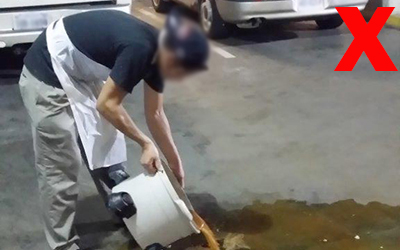Fairfax County's Municipal Separate Storm Sewer System (MS4) permit requires the county to implement an illicit discharge and improper disposal (IDID) program to prohibit any individual non-stormwater discharge to the county MS4 and to state waters. The MS4, also known as the storm drainage system, was designed to convey runoff from rain and snowmelt from the land to surface waters such as streams and rivers. Material that enters Fairfax County's MS4 does not go to a wastewater treatment plant. Therefore, chemicals and waste materials must not be disposed of in the MS4.
What is an IDID?
 Fairfax County defines an IDID as the intentional or unintentional release of non-stormwater materials that may enter the storm drainage system, streams or ponds by dumping, pouring, throwing, spilling, abandoning, negligent storage or through an illicit connection.
Fairfax County defines an IDID as the intentional or unintentional release of non-stormwater materials that may enter the storm drainage system, streams or ponds by dumping, pouring, throwing, spilling, abandoning, negligent storage or through an illicit connection.
Fairfax County defines an illicit connection as a pipe that is improperly connected to the storm drainage system and transports non-stormwater materials into a storm drainage system. For example, sometimes a sanitary sewer or wastewater pipe is improperly connected to an open channel or stream and transports non-stormwater materials directly to a body of water.
Some discharges are not considered illicit because they are authorized by the MS4 permit. These include discharges that have a Virginia Pollutant Discharge Elimination System (VPDES) permit as well as some specific discharges that are not considered to be a significant source of pollutants such as dechlorinated swimming pool water and irrigation water.